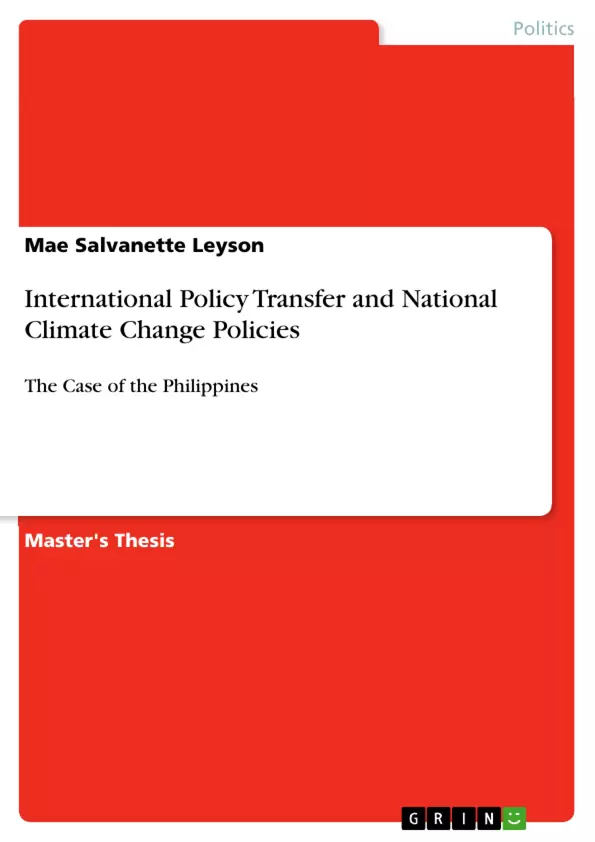This paper analyzed the Philippines´ climate change policies through the lens of Policy Transfer.
Inhaltsverzeichnis (Table of Contents)
- Introduction
- Conceptual and Analytical Framework
- Policy Learning - Definition, Concept and Types
- Policy transfer as an analytical framework
- Research operationalization and definition of terms
- Overview of International Climate Change Agreements and Institutions
- Evolution of international climate change agreements
- The United Nations Framework Conventions on Climate Change (UNFCCC)
- The Kyoto Protocol
- The Intergovernmental Panel on Climate Change (IPCC) and its reports
- Summary Commitments and Obligations of Developing Countries
- Overview of the Philippines' Climate Change Policies
- Policy Context
- Evolution of the Philippines' climate change policies
- Mitigation policies
- Adaptation Policies
- Organizational Arrangements
- Analysis - Policy Transfer and the Philippines' Climate Change Policies
- Policy Transfer Framework Analysis
- Policy transfer and policy results
Zielsetzung und Themenschwerpunkte (Objectives and Key Themes)
This master thesis investigates the process of policy transfer in the context of national climate change policies in the Philippines. The study aims to analyze the influence of international climate change agreements and institutions on the development and implementation of climate change policies in the Philippines.
- Policy learning and transfer
- International climate change agreements and institutions
- The Philippines' climate change policies
- Mitigation and adaptation measures
- Policy transfer and policy outcomes
Zusammenfassung der Kapitel (Chapter Summaries)
The introduction provides an overview of the research topic, outlining the significance of policy transfer in the context of climate change. The study examines the Philippines as a case study, focusing on the country's climate change vulnerabilities and the need for effective policy responses.
Chapter 2 delves into the conceptual and analytical framework of the study. It defines and discusses policy learning and policy transfer, exploring different types of policy transfer and their implications. The chapter also outlines the research methodology and key terms employed in the analysis.
Chapter 3 provides a comprehensive overview of international climate change agreements and institutions, tracing their evolution and outlining key commitments and obligations for developing countries. It explores the role of the United Nations Framework Convention on Climate Change (UNFCCC), the Kyoto Protocol, and the Intergovernmental Panel on Climate Change (IPCC) in shaping global climate change policy.
Chapter 4 examines the Philippines' climate change policies, highlighting their historical development, current policies, and organizational arrangements. It explores the country's policy context, including its vulnerabilities and mitigation and adaptation measures.
Chapter 5 analyzes the policy transfer framework in the context of the Philippines' climate change policies. It investigates the influence of international agreements and institutions on the development and implementation of national policies, assessing the impact of policy transfer on policy outcomes.
Schlüsselwörter (Keywords)
This thesis focuses on the key concepts of policy learning, policy transfer, international climate change agreements, climate change policies, mitigation, adaptation, the Philippines, and policy outcomes. It delves into the dynamics of international and national climate change policymaking, examining the influence of global frameworks on national policy development and implementation in the Philippines.
Frequently Asked Questions
What is "Policy Transfer" in the context of climate change?
Policy transfer refers to the process where knowledge, policies, and administrative arrangements from one political system (often international) are used in the development of policies in another (national) system.
How have international agreements influenced the Philippines?
Agreements like the UNFCCC and the Kyoto Protocol have shaped the Philippines' national strategies for climate change mitigation and adaptation.
What are the main climate policies of the Philippines?
The study examines the evolution of policies focused on mitigation (reducing emissions) and adaptation (adjusting to climate impacts) and the organizational structures created to manage them.
What is the role of the IPCC in national policymaking?
The Intergovernmental Panel on Climate Change (IPCC) provides the scientific reports that serve as a basis for policy learning and the justification for national climate laws.
Does policy transfer lead to effective results?
The analysis evaluates the impact of transferred policies on actual outcomes, considering the country's specific vulnerabilities and socio-political context.
- Citation du texte
- Mae Salvanette Leyson (Auteur), 2011, International Policy Transfer and National Climate Change Policies, Munich, GRIN Verlag, https://www.grin.com/document/265193



